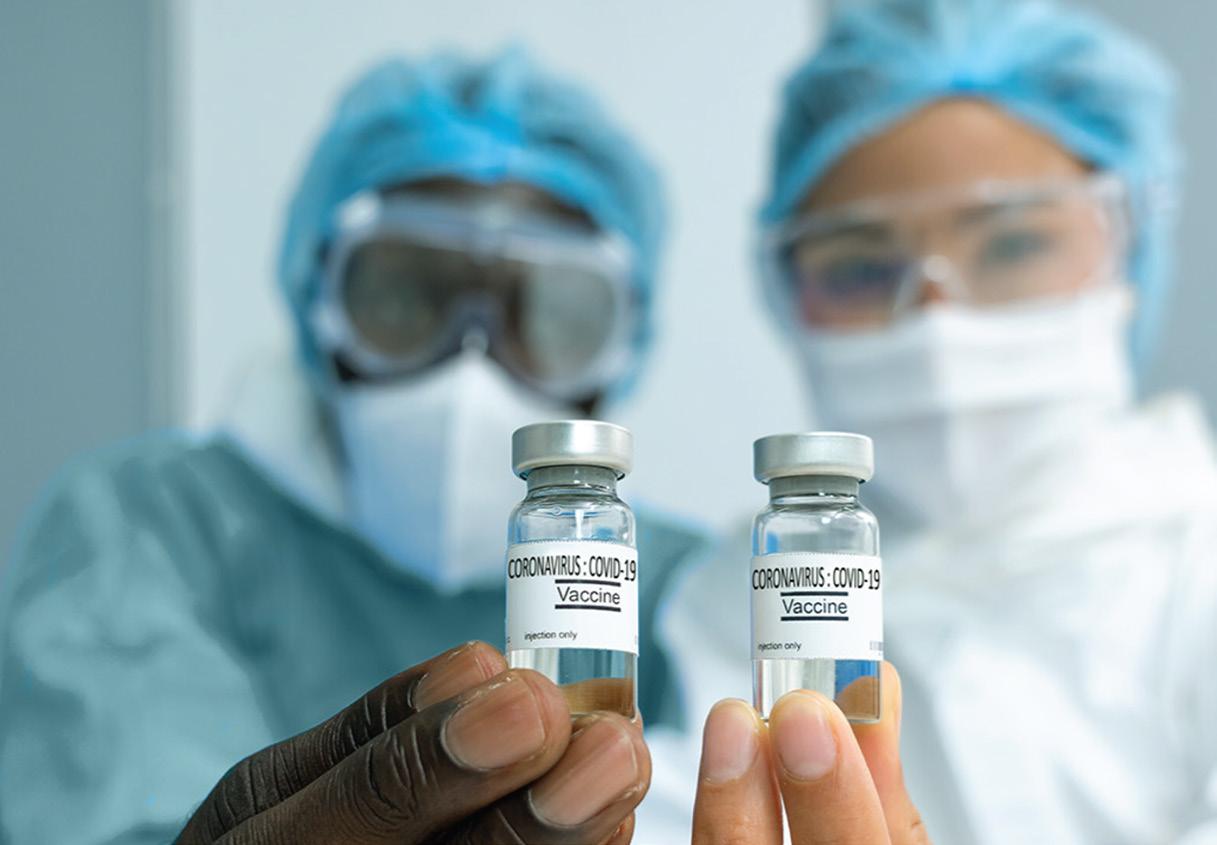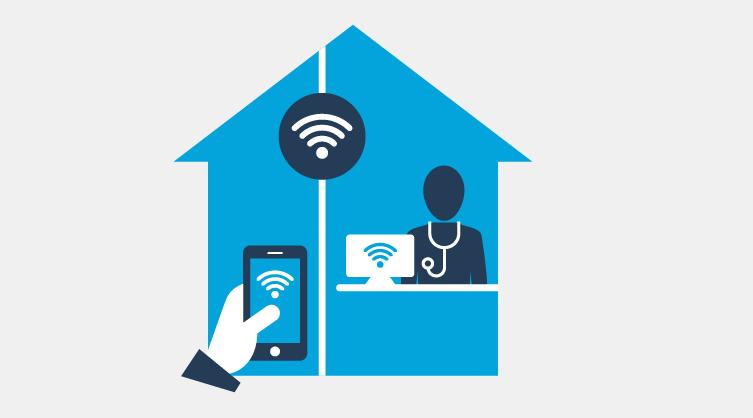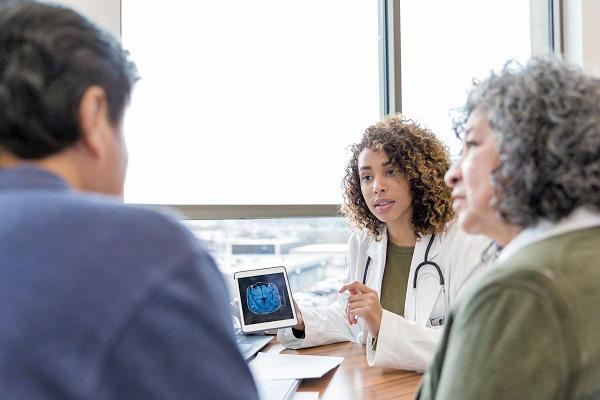
14 minute read
Hospital News
Henry Ford Macomb Hospital
POST ICU BRAIN HEALTH CLINIC FOR COVID-19 PATIENTS OPENS
Advertisement
Henry Ford Health System has established a specialty clinic to treat COVID-19 and other patients who have lingering cognitive, emotional and mental health conditions after being hospitalized in the intensive care unit.
As an increasing number of COVID-19 patients recover and are discharged from the hospital, it is anticipated that well into the future, many will need help getting back to their normal physical and mental functioning. Henry Ford’s Post ICU Brain Health Clinic opened recently at its neuropsychology centers in Detroit and West Bloomfield. Clinic staff conduct evaluations, make recommendations for treatment and provide resources for anyone ages 55 and older who was hospitalized in the ICU in the past year and continues to experience cognitive, behavioral or psychiatric symptoms. In addition, services will be offered for caregivers to learn new tools and strategies for caring for and supporting their loved one as well as home health visits to assist patients with using telemedicine.
The clinic is headed by board-certified neuropsychologists with specialized expertise in aging, neuropsychiatric conditions, assessment and treatment of older adults and caregivers. It was made possible by a $500,000 Healthy Aging Grant from the Michigan Health Endowment Fund. A portion of the funding will be allocated to help uninsured patients overcome their financial barrier to receiving these much-needed services. “Patients who end up in the ICU can experience lasting issues with mental processing and carrying out simple tasks,” said project coordinator Maya Pinjala, PhD. “Also, emotional issues may be compounded because patients are not able to have visitors in the hospital or establish a personal connection with their providers because of the facemask and other PPE they’re wearing.” Critical illness represents a serious condition that requires treatment in an ICU. Approximately 1.4 million older adults in the United States survive an episode of critical illness each year, and an estimated 30% to 80% of them experience a wide range of physical, cognitive, and psychiatric impairments following discharge from the hospital. Family members of ICU patients may also experience anxiety, acute stress disorder, post-traumatic stress, depression, or complicated grief, a syndrome known as post-intensive care syndrome-family (PICS-F), which can directly affect the family member’s ability to fully engage in caregiving functions. As a result of their ICU experience, some patients will also suffer from mental health disorders such as PTSD, anxiety, problems sleeping and depression. “This clinic aims to minimize post intensive care syndrome (PICS) symptoms and maximize a patient’s recovery from serious illness,” said Brad Merker, PhD, Division Head of Neuropsychology for Henry Ford’s Behavioral Health Services. Once a referral is made and criteria are met, patients and caregivers will complete a comprehensive neuropsychological examination to help understand their difficulties. A portion of the evaluation will be conducted virtually, and the other half completed at the clinic. Referrals for patients and their caregivers can be made by calling 313-874-4846.
Henry Ford Health System is taking telemedicine to a new level with technology that allows doctors to remotely look inside a patient’s throat and ears, listen to their heart and lungs, examine skin conditions and more without the patient having to leave their home. Approved for use by the U.S. Food and Drug Administration, the Tyto Care™ technology in the Henry Ford Virtual Exam Kit has a built-in camera and three special adapters—an otoscope, a stethoscope and a tongue depressor—that enhances the capability and convenience of a virtual visit. “As the number of patients choosing telemedicine remains high, we’re excited to be the only healthcare system in eastern Michigan to bring this game-changing technology to our patients,” said Steven Kalkanis, MD, CEO of the Henry Ford Medical Group and Senior Vice President and Chief Academic Officer of Henry Ford Health System. “We believe this technology elevates the video visit experience and may help patients avoid an in-person visit to urgent care or the emergency department.” The hand-held device in the virtual exam kit fits in the palm of your hand. It connects with your smartphone, then securely to My Chart, a free service offered to Henry Ford patients that
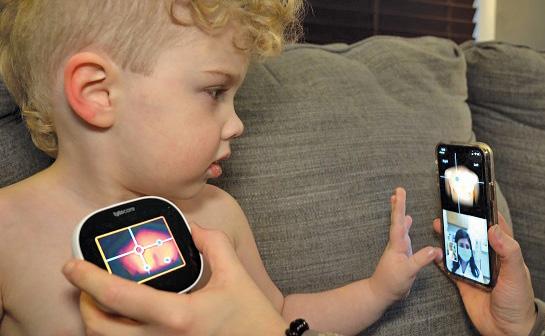
provides secure online access to their medical information and connects to a telemedicine visit.
“The technology blows you away,” said Diane George, DO, a family medicine physician and Chief Medical Officer for primary care at Henry Ford, adding that the clarity listening to the lungs and other sounds is equal to or even better than doing so in-person. The user-friendly device guides patients and caregivers through exams. Visual cues on the display screen show users where to place the device so their doctor can accurately capture heart, lung and abdominal sounds as well as images of the throat, ears, and skin. The built-in camera makes it easy for patients to show their doctor a rash or other skin condition. “This past year reminded us that we must be flexible and adaptable to new ways of caring for our patients,” Dr. Kalkanis said. “By rolling out this virtual exam kit, we’re taking another step down the road of adapting our health care system’s approach to care.” While video visits are effective and popular, Dr. George acknowledged there are limitations. “This technology takes what otherwise would have been just a video - where you really just have to pick up on facial cues and tone of voice and rely on patient history and the presence or absence of other symptoms to make a diagnosis - and adds the same exam elements patients get during an in-person visit,” she said.
The medical exam kit costs $299. Because it’s an FDA-approved medical device, most insurance companies, including Health Alliance Plan, allow patients to use their flexible savings account or health savings account to cover the cost. Henry Ford Virtual Exam Kit can be purchased online at
https://www.henryford.com/services/virtual-care/tyto
STUDY: RACE MADE NO DIFFERENCE IN ICU OUTCOMES OF COVID-19 PATIENTS
In a study that looked at racial differences in outcomes of COVID-19 patients admitted to the intensive care unit, researchers at Henry Ford Hospital in Detroit found that patients of color had a lower 28-day mortality than white patients. Race, however, was not a factor in overall hospital mortality, length of stay in the ICU or in the rate of patients placed on mechanical ventilation, researchers said.
The findings, published in Critical Care Medicine, are believed to be one of the first in the United States to study racial differences and outcomes specific to patients hospitalized in the ICU with COVID-19. Since the start of the pandemic, data have shown that Black and Hispanic populations have higher rates of COVID-19 infections, hospitalizations and mortality. The Henry Ford study found just the opposite. “What we wanted to look at was once patients are in the ICU, does that same racial disproportion occur. And the answer is no,” said Michael Lazar, MD, a Henry Ford pulmonology and critical care medicine physician and the study’s lead author. “The care we deliver is essentially the same and race makes no difference.” Researchers theorized that the 28-day mortality in patients of color could be easily explained: The deaths among patients of color were delayed. Seven of the nine patients who died in the hospital after 28 days were patients of color. Still, they said their findings reflect more about the level of care provided in the ICU than racial differences. “What we do in the intensive care is driven by protocol and everyone is approached similarly,” said Jeffrey Jennings, MD, a Henry Ford pulmonology and critical care medicine physician and the study’s senior author. Detroit was one of the cities hardest hit in the first surge of the pandemic. Henry Ford Hospital is the largest of the five acute-care hospitals in the Henry Ford Health System. To date, the health system has treated more than 44,000 patients with COVID-19 and more than 11,000 patients with COVID-19 have been hospitalized. For the retrospective study, researchers evaluated the electronic medical records of 365 COVID-19 patients 18 and older who were admitted to the ICU between March 13, 2020 and July 31, 2020. The patients were divided into two groups: White and people of color, which included Black, Asian, Hispanic/Latino and Arab populations. Of the 365 patients, 219 were Black, 129 were White, eight were Hispanic/Latino, seven were Arab and two were Asian.
In other demographics, 205 patients were men and 160 women. The people of color group were slightly younger, 62.8 years, compared to the White group, 67.1 years. Co-morbidities ranged from COPD and asthma to hypertension, diabetes and coronary artery disease. Other key highlights in the study: • Overall mortality in the two groups was 50% • Nearly 75% required mechanical ventilation • While most patients were treated with steroids early in their hospitalization, it was not a significant predictor of mortality
Michael Lazar, MD Jeffrey Jennings, MD

McLaren Macomb Hospital
MCLAREN MACOMB DONATES $10,000 TO MACOMB FOOD PROGRAM, URGES OTHERS TO FOLLOW
The Macomb Food Program has been addressing local food insecurity for more than 40 years, and the need has never been higher than it has been over the past year. It was with this in mind that McLaren Macomb, the 288-hospital serving all of Macomb County, donated $10,000 to the program to assist the organization with its continuing mission. L-R McLaren Macomb president and CEO Tom Brisse, Macomb Food Program director Linda Azar, Macomb Food Program manager ShanLeaders at McLaren non Mallory, McLaren Macomb vice president Macomb urge everyone with the of marketing Sharyl Smith, Macomb County Executive Mark Hackel. means to do so to please support the Macomb Food Program. “The pandemic has caused an unbelievable amount of heartache and anguish within our community, not least of which is the rise of food insecurity,” said Tom Brisse, McLaren Macomb president and CEO. “More and more families have been forced to turn to local food pantries, and our hope for this donation is that it inspires others to donate or in any way support the amazing mission of the Macomb Food Program.” McLaren Macomb’s donation was born out of a social media awareness campaign in which the hospital promised to make the sizable donation while encouraging others to follow with their own consideration for the organization. The post was seen by more than 15,800 people and shared more than 450 times. “Thank you for McLaren Macomb’s continued support and its generous gift to the Macomb Food Program,” said Shannon Mallory, Macomb Food Program manager. “Through their donation, we are able to continue working towards ending hunger in Macomb County. They have truly made a difference for our program and our community, and we are extremely grateful.” The mission of the Macomb Food Program, since its founding in 1975, is to provide food to hungry people in Macomb County. The organization distributes food at no cost to over 70 partner pantry and hunger organizations throughout the county. Last year the Macomb Food Program distributed more than 3.3 million pounds of emergency food to our network partners, serving over 220,000 individuals. To learn more about the Macomb Food Program and to make a donation, visit the organization at www.mca.macombgov. org/mca-es-food.

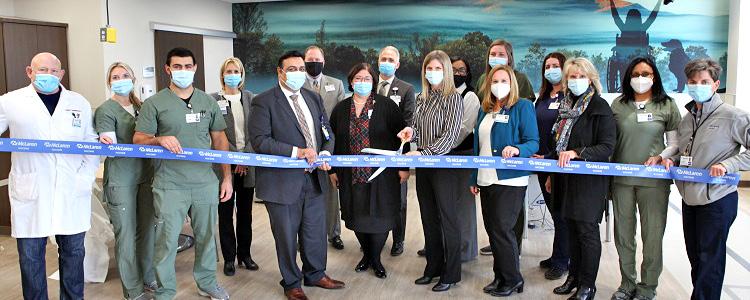
As part of its effort to offer a complete continuum of care for its patients, McLaren Macomb has expanded its services to include inpatient rehabilitation. The new unit is a uniquely designed inpatient unit in which patients recovering from surgery, injury or illness undergo specialized, intensive and supervised rehabilitation to regain their physical capabilities and independence. Opening the unit and expanding the service within McLaren Macomb allows patients who are recovering from stroke, traumatic injury, brain injury, amputation or other conditions to advance their recovery at the hospital that initially treated them rather than being transferred to another facility. A multidisciplinary team of physicians, nurses and therapists will coordinate the patients’ care to ensure they reach the point in their recovery to be safely discharged from the hospital and effectively continue their rehab at home or in an outpatient setting. Physiatrist Dr. Michelle Bradley, a physical medicine and rehabilitation specialist, will oversee the new unit as its medical director.
“Even though they have advanced into their initial recovery, many patients, due to the severity of their illness or injury, or for other factors, are not yet at the point where they can yet be discharged home,” Dr. Bradley said. “Patients recover best at home, in a familiar, comfortable environment, and getting them to the point where they can actively continue productive rehabilitation at home is advantageous for everyone.” The 18-bed unit contains a rehabilitation gym with specialized equipment using the latest technology, and a living center designed to reflect the home environment, allowing patients to practice daily activities (such as getting up from the couch, out of bed, using the tub, cooking in the kitchen, among many others) under the guidance of clinical professionals. Construction of the new unit began in the summer of 2020 and was completed in early February shortly before it opened. McLaren Macomb invested $12 million into the entire project.
“The unit will provide an immeasurable benefit to our community, who deserve to have their entire continuum of care close to home and their support system,” said Tom Brisse, president and CEO of McLaren Macomb. “An inpatient rehabilitation unit has been a goal of this hospital for many years, decades even. To see this project realized is very exciting to many people, both to those of us here now and those who are a part of our hospital’s extensive history.” The opening of the new service marks the next in a successive line of projects expanding McLaren Macomb’s services or access to care. In the summer of 2020, the hospital opened the Wayne and Joan Webber Emergency and Trauma Center, the largest emergency department in Macomb County. Just before the close of the year, a new, larger Medical Outreach Clinic was debuted. Additionally, McLaren Macomb regularly introduces new procedures or pieces of medical technology to the area. Learn more about the services offered at McLaren Macomb at www.mclaren.org/macomb. Feinstein Memorial Award from the American College of Physicians, a national organization of internists. The award honors the late Dr. Feinstein, who is internationally recognized as the father of clinical epidemiology, and is given to an American physician who has made a major contribution to the science of patient care in activities that Dr. Feinstein has broadly defined as clinical epidemiology or clinimetrics, involving the direct study of patients’ clinical conditions. As it relates to this award, Dr. Saravolatz has an outstanding track record of scholarly work in Infectious Diseases that has helped in understanding the epidemiology and treatment of numerous pathogens, including Legionella, methicillin-resistant Staphylococcus aureus and HIV. He has also served on numerous local, regional and national committees to help with advancing our knowledge in these and other infectious diseases. Dr. Saravolatz is currently continuing his research by studying the epidemiology of COVID-19 as well as leading a COVID-19 vaccine trial. He has also been directing the development of the Thomas Mackey Center for Infectious Disease Research at Ascension St. John Hospital.
Ascension Macomb-Oakland Hospital
ASCENSION ST. JOHN HOSPITAL GI INTERVENTIONAL PROGRAM GETS NEW RADIO FREQUENCY (RF) TECHNOLOGY
Ascension St. John Hospital GI Interventional Program has acquired the VIVA Combo RF Generator System. This device performs Endoscopic Ultrasound Guided Radio Frequency Ablation (EUS-RFA) and Endo-Luminal Radio Frequency Ablation (ERLA-RFA). Mohamed Barawi, MD, and the Endoscopy department at Ascension St. John Hospital are excited to be one of the few centers in the nation to offer both of these therapies. The VIVA Combo RF Generator System has been used to ablate benign pancreas tumors (neuroendoPictured L – R: Marquita Moore, crine tumors), advanced pancreas Endoscopy Tech; Kevin Paret, cancers, cholangiocarcinomas Endoscopy Tech; Mohammed Barawi, MD, Chief of Gastroenterand tumors that are unresectable ology; James Potts, VIVA Represen- to help alleviate pain. The device tative; Briana Willis, RN, Clinical can ablate tissue in the GI tract, Nurse Manager, Endoscopy; and including the pancreas and biliary Nicole Chambers, RN. ducts and/or strictures, clear tumor invaded stents, thyroid nodules, malignant lymph nodes and more.
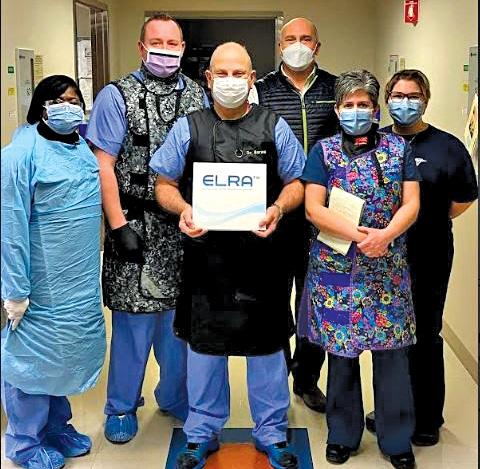
DR. LOUIS D. SARAVOLATZ RECEIVES NATIONAL AWARD FROM THE AMERICAN COLLEGE OF PHYSICIANS
Louis D. Saravolatz, MD, MACP, chairman of internal medicine at Ascension St. John Hospital, has been awarded the Alvan R.
Louis D. Saravolatz, MD, MACP
ASCENSION COMMUNITY VACCINATION CLINIC AT MCC CELEBRATES MILESTONE VACCINATION
On March 12, the Ascension Community Vaccination Clinic in SE Michigan at Macomb Community College (MCC) vaccinated its 30,000th patient! Pictured is Ascension caregiver Alex Fallone (right) administering the “Shot of Hope” to Mary McCarthy of Northville. Congratulations to the vaccine operations team and volunteers who support the Community Vaccination Clinic at MCC on this milestone. The MCC site administers upwards of 1,100 shots (1st and 2nd doses) per day.

ASCENSION MACOMB-OAKLAND HOSPITAL ASSOCIATE JOINS MDHHS COVID-19 VACCINE WORK GROUP
Evone Barkho, MPH, IBCLC, an associate at Ascension Macomb-Oakland Hospital, recently was named to the Michigan Department of Health and Human Services (MDHHS) Middle Eastern COVID-19 Vaccine Workgroup. The goal of the workgroup is to help identify and address barriers that may prevent the acceptance of an approved COVID-19 vaccine by Michigan’s Middle Eastern residents.
ASCENSION MICHIGAN HOSPITALS RECEIVE “GOING THE DISTANCE” QUALITY AWARDS
Wound care centers located at four Ascension Michigan hospitals earned the 2020 Going the Distance quality award




